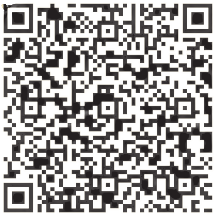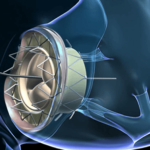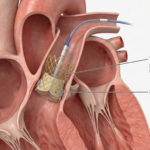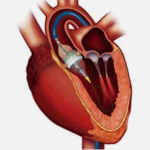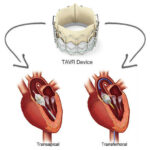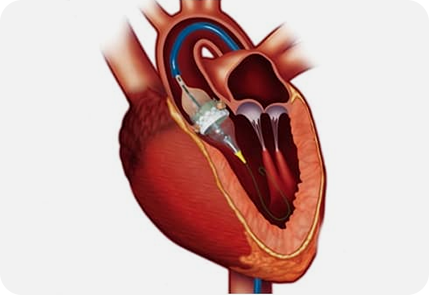 31 October, 2025
31 October, 2025
Heart Valve Replacement in India — Precision Medicine That Restores the Rhythm of Life
The heart beats more than 100,000 times a day. Behind this effortless rhythm lie four delicate valves—the aortic, mitral, tricuspid, and pulmonary—that open and close in perfect synchrony to guide the flow of blood. When these valves begin to narrow or leak, the heart’s workload rises silently. Over time, fatigue, shortness of breath, swelling of the ankles, or chest pressure become early warning signs of structural damage.
In India today, thousands of patients are regaining normal heart function through advanced heart valve replacement. From conventional surgical approaches to the most sophisticated Transcatheter Valve Therapies (TAVR, TMVR, TTVR, TPVI), cardiac science has entered an era where life-saving precision can be achieved without opening the chest.
This article explains what heart valve replacement involves, the various procedures available in India, the innovations driving better outcomes, and why specialists such as Dr A.B. Gopalamurugan, one of India’s foremost interventional cardiologists, are leading the nation toward a new benchmark in cardiovascular care.
Understanding Heart Valve Disease
Each of the four valves functions as a one-way gateway. When healthy, they allow blood to move forward and prevent back-flow. When diseased, they may either:
-
Narrow (Stenosis): restricting the amount of blood leaving or entering a chamber; or
-
Leak (Regurgitation / Insufficiency): allowing blood to flow backward.
Over years, conditions such as rheumatic fever, degenerative calcification, congenital malformations, infective endocarditis, or even radiation exposure can damage the valves.
Left untreated, these defects can trigger heart failure, rhythm abnormalities, pulmonary hypertension, and, in severe cases, sudden cardiac arrest.
Early diagnosis using echocardiography, CT angiography, and cardiac MRI is vital. When the damage becomes irreversible, valve repair or replacement remains the definitive solution.
When Is Heart Valve Replacement Recommended?
Your cardiologist may advise valve replacement if:
-
The valve opening becomes severely narrow (critical stenosis).
-
The valve leaks enough to cause heart enlargement or fluid accumulation.
-
You experience symptoms such as fainting, chest discomfort, or breathlessness even with medication.
-
There is evidence of reduced heart pumping efficiency on echocardiogram.
-
Prior valve surgery or replacement is failing.
Replacing the faulty valve with an artificial one restores normal hemodynamics, relieves symptoms, and significantly improves life expectancy.
Types of Heart Valve Replacement Procedures
1. Surgical Aortic or Mitral Valve Replacement (SAVR/MVR)
The traditional open-heart approach involves temporarily stopping the heart under anesthesia, opening the chest, and sewing in a new valve.
Advantages
-
Long-term durability and versatility across complex anatomies.
-
Ability to address multiple valve issues simultaneously.
Considerations
-
Requires cardiopulmonary bypass.
-
Slightly longer recovery time (4–6 weeks).
For younger, otherwise healthy patients, surgical replacement remains an excellent and durable option.
2. Transcatheter Valve Replacement (TAVR, TMVR, TTVR, TPVI)
A transformative alternative for patients at intermediate or high surgical risk, transcatheter procedures are performed through a tiny puncture—often in the groin—without opening the chest.
A pre-loaded artificial valve mounted on a catheter is guided through blood vessels to the heart and expanded inside the diseased valve. The entire procedure is performed under real-time imaging and often under conscious sedation rather than general anesthesia.
Advantages
-
No open surgery or stitches.
-
Reduced hospital stay (2–3 days).
-
Rapid return to normal activity—many patients walk within 24 hours.
-
Comparable or better outcomes in the elderly and fragile population.
Dr A.B. Gopalamurugan has been instrumental in introducing and refining transcatheter valve therapies in India. He also performed India’s first emergency TAVR using Aortic Ultrasound (AVUS)—a groundbreaking step toward imaging-guided precision cardiology.
Types of Valves Used in Replacement
Mechanical Valves
Manufactured from advanced carbon and titanium alloys, mechanical valves can last a lifetime.
Benefits: exceptional durability.
Limitation: require lifelong anticoagulant medication (warfarin) to prevent clots.
Best suited for: younger patients (< 60 years) with good medication compliance.
Bioprosthetic (Tissue) Valves
Crafted from specially treated bovine or porcine tissue, these valves mimic the natural motion of the human valve.
Benefits: excellent flow and no need for lifelong blood thinners.
Limitation: durability of 10–15 years.
Best suited for: older patients or those in whom anticoagulation is risky.
Valve-in-Valve Implantation
For patients whose previous prosthetic valve is degenerating, Valve-in-Valve TAVR allows placement of a new valve inside the old one—without reopening the chest. This approach has dramatically reduced re-operation risk.
Advanced Transcatheter Valve Technologies Available in India
Transcatheter Aortic Valve Replacement (TAVR)
TAVR addresses severe aortic stenosis, a condition common in elderly patients. The new valve is inserted via femoral access and expanded inside the diseased aortic valve.
Dr Gopalamurugan’s use of intra-aortic ultrasound guidance (AVUS) has elevated safety and precision in emergency scenarios.
Transcatheter Mitral Valve Replacement (TMVR)
TMVR benefits patients with mitral regurgitation or calcific stenosis where surgery is high-risk. Imaging systems ensure accurate placement within the beating heart, restoring normal blood flow to the lungs and body.
Transcatheter Tricuspid Valve Replacement (TTVR)
Once considered inoperable, severe tricuspid disease can now be corrected through this catheter-based option, dramatically improving symptoms of swelling and fatigue linked to right-sided failure.
Transcatheter Pulmonary Valve Implantation (TPVI)
TPVI is primarily used in congenital heart disease patients or those with prior surgical repairs. It avoids repeat open-heart procedures, helping young adults resume normal lives quickly.
Preparing for the Procedure
A multidisciplinary team conducts comprehensive assessments including:
-
Transthoracic and transesophageal echocardiography
-
CT angiography of heart and aorta
-
Coronary angiography (if required)
-
Blood tests, lung evaluation, and medication review
Based on anatomy and overall health, the cardiology team determines whether surgical or transcatheter replacement is best suited.
Recovery and Life After Valve Replacement
Hospital Stay:
-
2–3 days for transcatheter procedures
-
5–7 days for open surgery
Rehabilitation:
Light physical activity begins within a week. Most patients return to work or travel within a month. Cardiac rehabilitation and regular follow-ups are strongly recommended.
Lifestyle Recommendations:
-
Heart-healthy diet and moderate exercise
-
Regular anticoagulant and INR monitoring (for mechanical valves)
-
Annual echocardiograms to monitor function
With proper care, over 90 percent of patients live active, fulfilling lives after valve replacement.
Cost of Heart Valve Replacement in India
One of India’s strengths is access to advanced cardiac care at a fraction of international costs.
Typical ranges include:
| Procedure | Approximate Cost (INR) | Hospital Stay |
|---|---|---|
| Surgical Valve Replacement | ₹3 – ₹6 lakhs | 5–7 days |
| TAVR / TMVR | ₹15 – ₹25 lakhs | 2–3 days |
| Valve-in-Valve TAVR | ₹18 – ₹28 lakhs | 2–3 days |
Prices vary by hospital, device type, and patient profile. Despite lower costs, clinical outcomes match leading Western centres, making India one of the world’s top destinations for cardiac treatment.
Why Choose India — and Dr A.B. Gopalamurugan
Global Expertise at Your Doorstep
Dr Gopalamurugan trained in the UK, spending 16 years across North London hospitals and Great Ormond Street Hospital, gaining specialist accreditation in interventional cardiology, electrophysiology, and device therapy.
Leader in Transcatheter Therapies
He has pioneered every major advancement in structural heart disease treatment in India, including the first Emergency TAVR with AVUS and numerous complex multi-valve procedures.
Educator and Innovator
Founder of INDIAVALVES, India’s largest educational course on transcatheter valve therapies, he trains cardiologists nationwide on safe, evidence-based techniques.
Comprehensive Care Network
Practicing across Chennai, Mumbai, and London, he offers seamless continuity of care for local and international patients.
Patient-Centric Philosophy
Every decision—from imaging evaluation to valve selection—is personalized for optimal safety, recovery, and long-term durability.
Step-by-Step Journey for Patients Undergoing Valve Replacement
-
Initial Consultation: Clinical assessment and diagnostic imaging.
-
Heart Team Discussion: Interventional cardiologist, cardiac surgeon, and anesthetist review options.
-
Procedure Planning: 3D reconstruction and valve sizing using CT scans.
-
Valve Replacement: Either surgical or transcatheter.
-
Monitoring and Recovery: Post-procedure echocardiogram confirms valve function.
-
Rehabilitation and Follow-up: Lifestyle advice, medication review, and scheduled visits at 3, 6, and 12 months.
Long-Term Outlook and Durability
Modern valve designs have significantly improved durability and function.
-
Mechanical valves routinely last 25–30 years.
-
Tissue valves show 10–20 years of function, depending on age and calcium metabolism.
-
Transcatheter valves demonstrate similar long-term outcomes to surgical tissue valves.
Continuous global research, such as polymer-based leaflets and anti-calcification coatings, promises even greater longevity for the next generation of valves.
Frequently Asked Questions (FAQs)
1. What is the success rate of heart valve replacement in India?
With modern equipment and experienced specialists, success rates exceed 95 percent for surgical and 98 percent for transcatheter replacements.
2. How long does a heart valve replacement last?
Mechanical valves > 25 years; tissue valves 10–15 years; transcatheter valves offer comparable durability.
3. Can elderly patients undergo TAVR safely?
Yes. TAVR was developed precisely for high-risk and elderly patients and is performed routinely in India with excellent outcomes.
4. Will I need blood thinners after the procedure?
Mechanical valves require lifelong anticoagulants; tissue and transcatheter valves usually do not, except for short-term therapy.
5. When can I return to normal activities?
Light walking begins within days; most patients resume work in 3–4 weeks depending on procedure type and overall health.
6. What is the approximate cost of TAVR in India?
Between ₹15 lakh and ₹25 lakh depending on valve system, hospital, and complexity.
7. Who is considered a leading specialist for heart valve replacement in India?
Dr A.B. Gopalamurugan, Senior Interventional Cardiologist & Electrophysiologist, is recognized nationally and internationally for his pioneering work in TAVR and structural heart interventions.
Consultation and Contact
Chennai
2nd Floor, 46 & 48 Masilamani Road, Balaji Nagar, Royapettah, Chennai – 600014
Phone: +91 80560 88898 | +91 89400 88898 | +91 91760 88898
Email: secretary@gopalamurugan.com
Mumbai
81-84, Indian Cancer Society (Lady Ratan Tata Medical & Research Centre), M. Karve Road, Cooperage Street, Mumbai – 400021
London
W1 Healthcare, 7 Russell Gardens, London W14 8EZ, United Kingdom | +44 7425 861747




